An Unprecedented Call to Action
In a bold move that could reshape global alliances and strategies, former US President Donald Trump has reiterated his readiness to impose stringent sanctions on Russia. His condition? That NATO member states cease their burgeoning trade in Russian oil—a move that could significantly affect the dynamics of energy dependency within the alliance. Trump, known for his assertive foreign policy postures, has set the stage for a potential political standoff that could have wide-reaching implications. According to BBC, this situation develops amidst increasing tensions in Eastern Europe.
The Russian Oil Dilemma
Trump’s stance against the purchase of Russian oil is clear and unyielding. Describing such transactions as “shocking,” he argues that they erode negotiating power with Moscow. His proposal of imposing steep tariffs on China adds another layer to his complex geopolitical strategy, which aims to weaken Russia’s economic standing and influence. But will NATO nations heed his call?
Economic Jigsaw: Cutting Ties and Tariffs
Europe has progressively reduced its dependency on Russian energy since the invasion of Ukraine, dropping from 45% to a predicted 13% reliance on Russian gas. Yet, Trump’s perspective suggests these efforts are insufficient. He proposes a more aggressive stance, combining a complete halt to energy imports from Russia with punitive tariffs on China, all aimed at pressuring Moscow further.
Turbulence in Eastern Europe
Tensions have recently flared with Russian drones entering Polish airspace, raising alarms among NATO members. The incursion, perceived as deliberate, has sparked international unease, underlining the fragile state of affairs along Russia’s borders. Several European nations, such as Denmark, France, and Germany, have responded by reinforcing NATO’s eastern flank.
A Test for Transatlantic Alliances
The crux of Trump’s strategy lies in convincing Turkey, a NATO member with close ties to Russia, to sever its energy connections with Moscow. This diplomatic maneuver could prove to be a formidable challenge, given Ankara’s current stance.
The Weight of Financial Incentives
Since 2022, European payments for Russian oil and gas have amounted to an estimated €210bn—a significant contributor to Russia’s military prowess. Voices critical of this economic tether, such as Ukraine’s President Volodymyr Zelensky, advocate for its severance to counteract Russian aggression.
The Path Forward
As Trump awaits action from NATO nations, the political landscape is set for what could become a defining moment in international energy strategy and European security policy. His conditions signal not just an economic shift but a potential recalibration of power within global alliances. The stakes are high, and the global community is watching with bated breath, as history holds its gaze on what’s next for NATO and its energy crossroads.












